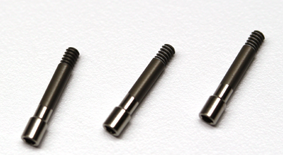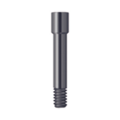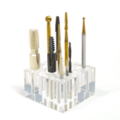
Anodizing of dental components
Anodizing Type II
Technology
The DOTIZE® anodizing process replaces the thin natural oxide film present at the implant surface by a thick oxide layer. Micropores and cracks in the base material are reduced by the anodisation. The DOTIZE® procedure conforms to the standard AMS 2488 (Aerospace Material Specification).
The DOTIZE® anodizing process replaces the thin natural oxide film present at the implant surface by a thick oxide layer. Micropores and cracks in the base material are reduced by the anodisation. The DOTIZE® procedure conforms to the standard AMS 2488 (Aerospace Material Specification).

Range of Application
Dental components (abutment screws, fixing screws)
Dental components (abutment screws, fixing screws)
Properties
- Color: dark gray to anthracite
- Coating thickness: 1–2 µm
- Roughness Rz: ≤ 3 µm
- Adhesion strength: ≥ 22 MPa
- Hardness: increase of ~25 %
- Hardened titanium surface
- Highly biocompatible
- Reduced risk of cold welding between components made from titanium
Advantages of the Procedure
- Increased resistance to wear compared with untreated titanium alloys
- Higher pre-loading of threaded connections is possible
- Increase of up to 15 % in the fatigue strength compared with untreated base material
- No changes in the dimensions of the parts
Anodizing Type III
Technology
The anodization type III (coloring) is performed in diluted acid. The titanium oxide film that is produced works as an optical interference filter. By varying the thickness of the coating all the colors of the rainbow can be produced. The standard colors produced are red, blue, yellow and green. Customers can also select from a larger range of colors.
The anodization type III (coloring) is performed in diluted acid. The titanium oxide film that is produced works as an optical interference filter. By varying the thickness of the coating all the colors of the rainbow can be produced. The standard colors produced are red, blue, yellow and green. Customers can also select from a larger range of colors.

Range of Application
Type III anodizing is qualified for implant components (screws, abutments, cover scews) which are provided in different sizes (e. g. different diameters).
Type III anodizing is qualified for implant components (screws, abutments, cover scews) which are provided in different sizes (e. g. different diameters).
Properties
- Colors according to the color scheme
- Coating thickness: 20–200 nm (depending on color)
- Roughness Ra: ≤ 0.05 µm (on polished surface)
- Adhesion strength: ≥ 22 MPa
Advantages of the Procedure
- Easier identification of implants
- Cosmetically appealing

Contact us - we are pleased to advise you!

CELLBIOTex®
Corundum-blasted, acid etched surface with bioactive calcium phosphate coating
Read more>>
Read more>>







